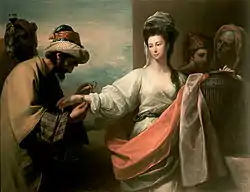Eliezer
Eliezer (Hebrew: אֱלִיעֶזֶר, Modern: Eli'ezer, Tiberian: ʼĔlîʻézer, "Help/Court of El") was the name of at least three different individuals in the Bible.
Eliezer of Damascus

Eliezer of Damascus (Hebrew: דַּמֶּשֶׂק אֱלִיעֶזֶר, Modern: Damméseq Eliʿézer, Tiberian: Damméśeq ʾĔlîʿézer) was, according to the Targums, the son of Nimrod.[1] Eliezer was head of the patriarch Abraham's household, as mentioned in the Book of Genesis (15:2).
And Abram said, "My Lord, Hashem/Elohim: What can you give me seeing that I go childless, and the steward of my house is the Damascene Eliezer?" — Lech-Lecha[2]
Medieval biblical exegetes have explained the noun ben mešeq as meaning "butler; steward; overseer",[3] while the name Damméseq Eliʿézer is explained by Targum Onkelos as meaning "Eliezer the Damascene." Others say that he was given the name "Damascus" by Abraham who purchased Eliezer from Nimrod, and had passed through the city of Damascus while returning with his servant from Babylonia.[3] Other translations of Genesis describe Eliezer as Abraham's heir.[4]
There is an interpretation in Bereshit Rabbah (43:2), cited by Rashi, that Eliezer went alone with Abraham to rescue Lot, with the reference to "his initiates" stated to be 318 in number (Genesis 14:14) being the numerical value of Eliezer's name in Hebrew, interpreted in tractate Nedarim (32a) as Abraham not wishing to rely on a miracle by taking only one individual.[5]
The servant of Abraham
According to most interpretations, the unnamed "servant, the elder of [Abraham's] house, that ruled over all that he had," (Genesis 24:2) who obtained Rebeccah as a bride for Isaac, was the same Eliezer. Although he is not named in the Bible, but only described as "Abraham's servant" (Genesis 24:34), Jewish tradition has that his name was Eliezer.[6]
The son of Moses
Eliezer was Moses' and Zipporah's second son. His name means "Help of my God" in Hebrew.
The verse in the Book of Exodus (18:4) states:
The name of the (other) son was Eliezer, because 'My father's God (Elohei Avi) was my helper (Bi'ezeri), rescuing me from Pharaoh's sword.
Both Gershom and Eliezer were born during the time Moses had taken refuge in Midian and had married Jethro's daughter Zipporah.
Eliezer the prophet
A prophet called Eliezer, son of Dodavah, rebuked King Jehosophat for aligning himself with Ahaziah, the King of Israel. He and Ahaziah built ships in Ezion-Geber which were to sail to Tarshish for trade. According to 2 Chronicles (20:37), the ships sank due to his not relying on the Lord:
Eliezer son of Dodavahu of Mareshah prophesied against Jehoshaphat, saying, "Because you have made an alliance with Ahaziah, the LORD will destroy what you have made." The ships were wrecked and were not able to set sail to trade.
See also
- Entering Heaven alive – regarding Eliezer, the servant of Abraham.
References
| Wikimedia Commons has media related to Eliezer. |
- Targum Jonathan Bereishit, 14:14
- Scherman, Nosson, TANACH, the Stone Edition, Mesorah Publications, New York, 1996, p. 31
- Nethanel ben Isaiah (1983). Sefer Me'or ha-Afelah (in Hebrew). Translated by Yosef Qafih. Kiryat Ono: Mechon Moshe. p. 86 (note 3). OCLC 970925649.
- Apple, Raymond, "The meaning of Dammesek Eliezer, "Jewish Bible Quarterly", Vol. 45, no. 3, July–September 2017 .
- Herczeg, Y.I.Z, The Torah: with Rashi's commentary, Vol.1, Mesorah Publications, New York, 2000, p. 138
- Eliezer Zalmanov, Why Is Eliezer Anonymous?, on Chabad.org
